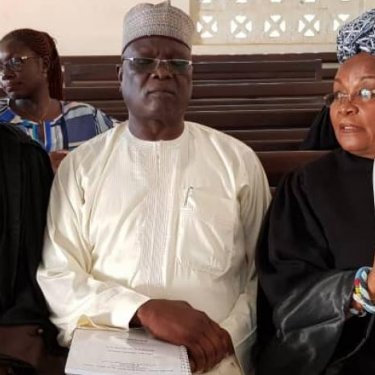RSF refers Cameroonian journalist’s detention to African special rapporteurs

Reporters Without Borders (RSF) has asked two special rapporteurs of the African Commission on Human and Peoples’ Rights (ACHPR) to examine the case of Amadou Vamoulké, a leading Cameroonian journalist who has been held on a spurious embezzlement charge for more than three years while his trial keeps on being adjourned.
Will the 23rd hearing in Vamoulké’s trial before a special criminal court, scheduled for 9 October, be the last? It seeks unlikely although, as a result of 22 consecutive adjournments, the trial has long exceeded the nine-month legal deadline for reaching a verdict.
Today, RSF formally referred Vamoulké’s detention to the African Commission’s special rapporteur on freedom of expression and access to information and to its special rapporteur on prisons and conditions of detention.
The African Commission is an offshoot of the African Union and its special rapporteurs are tasked with investigating human rights violations in member states, which include Cameroon. RSF has asked them to seek Vamoulké’s release by contacting the Cameroonian authorities, arranging a visit and publicly raising the issue of his detention.
“What with a record number of adjournments, a drawn-out trial violating both international standards and Cameroonian law, illegal preventive detention and denial of appropriate medical care although specifically sought in several medical certificates, no other African journalist has been subjected to this kind of judicial persecution in recent years,” said Arnaud Froger, the head of RSF’s Africa desk.
“In view of the limited possibilities of legal recourse in Cameroon, RSF has decided to step up pressure for this journalist’s release by referring the case to the African Commission on Human and Peoples’ Rights.”
If Vamoulké’s case is not resolved quickly, RSF could contact the African Commission directly and ask it to refer the case to the African Court on Human and Peoples' Rights with a view to getting the court to rule that Cameroon has violated his rights.
RSF wrote to President Paul Biya in March asking him to use his prerogatives to obtain the release of Vamoulké, whom he appointed as director-general of state-owned Cameroon Radio and Television (CRTV) in 2005.
After a group of French parliamentarians raised the case in February, the French foreign ministry noted that “the prosecution has not produced evidence of the appropriateness of its case,” and promised to pay close attention to the conclusions of the UN Working Group on Arbitrary Detention, to which RSF referred the case in January.
Despite the record number of hearings so far held in this trial, the prosecution has yet to produce any evidence or witness to support the accusation that Vamoulké misused state funds with the aim of benefitting CRTV.
Vamoulké’s health has deteriorated in recent weeks and two medical reports, one by Yaoundé’s central hospital and the other by the American Hospital of Paris, have clearly stated that he needs tests and treatment that are not available in Cameroon. In the absence of any prospect of an imminent end to his trial more than three years after his arrest, RSF is pressing for him to be medevacked.
Cameroon is ranked 131st out of 180 countries in RSF’s 2019 World Press Freedom Index.



